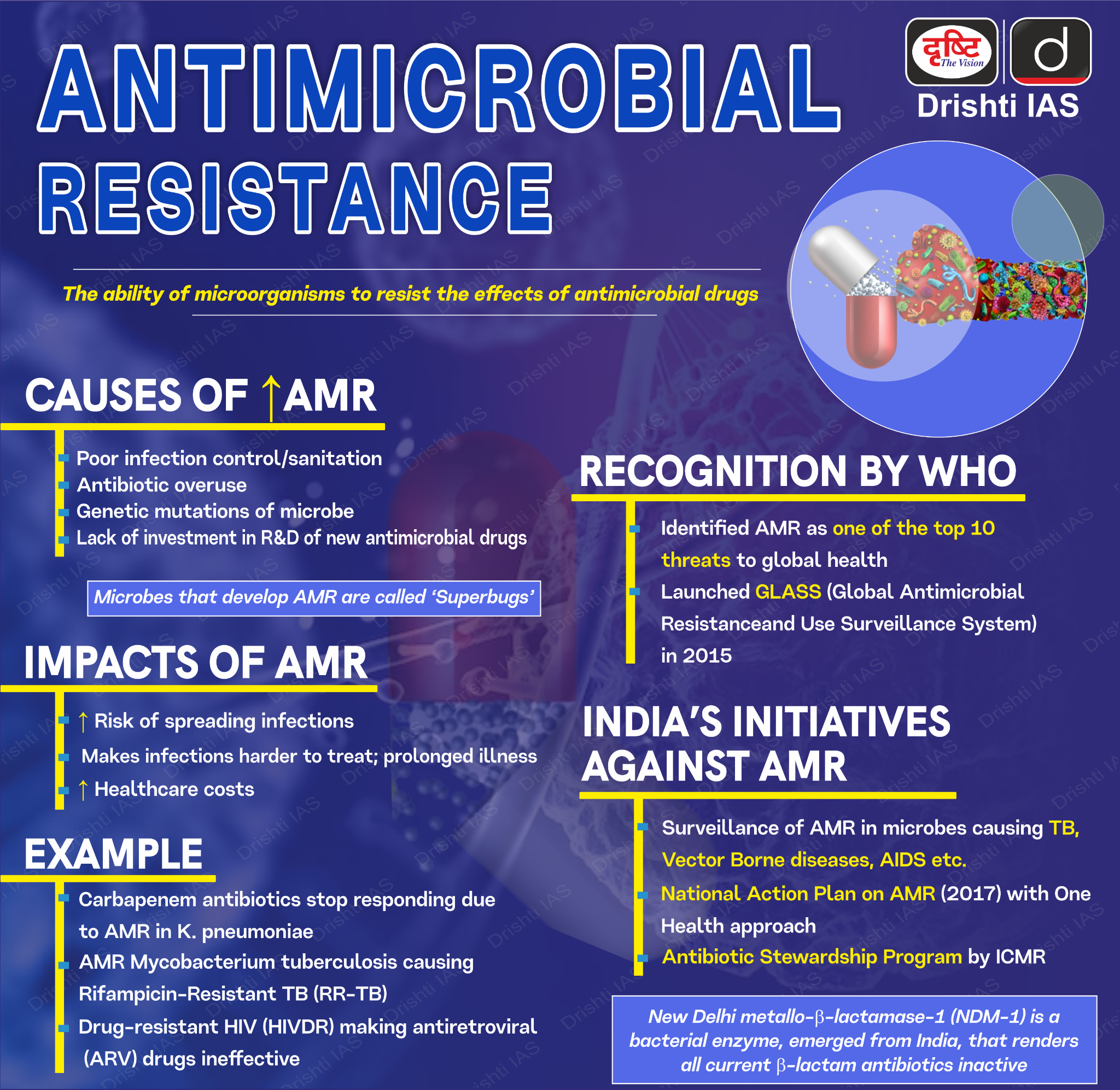Important Facts For Prelims
Jeddah Commitments on AMR
- 18 Nov 2024
- 6 min read
Why in News?
Recently, the 4th Global High-Level Ministerial Conference on Antimicrobial Resistance (AMR) concluded in Jeddah, Saudi Arabia, with the adoption of the Jeddah Commitments.
- Jeddah Commitments laid down practical, actionable and cross-sectoral steps stakeholders to address AMR-related goals by 2030.
- Its theme was “From Declaration to Implementation – Accelerating Actions Through Multisectoral Partnerships for the Containment of AMR.”
What are the Key Initiatives in Jeddah Commitments?
- Establishment of New Hubs: It announced an AMR 'One Health' Learning Hub and a regional Antimicrobial Access and Logistics Hub in Saudi Arabia to enhance access to essential antimicrobials and diagnostics.
- Biotech Bridge Initiative: It calls for the creation of a new ‘biotech bridge’ aimed at boosting research, development and innovation to find solutions to the global threat.
- Quadripartite Joint Secretariat (QJS) on AMR: It highlighted the role of QJS on AMR which aims to bolster efforts to prevent and reduce the rise of AMR.
- Other Key Actions:
- Establishment of an Independent Panel for Evidence on Action Against AMR by 2025.
- Creation of operational national AMR coordination mechanisms.
- Promotion of global data sharing through platforms like GLASS AMR/AMC, ANIMUSE, and INFARM.
- Adherence to Codex Alimentarius Commission guidelines for responsible antimicrobial use.
What are the Key Points about QJS on AMR?
- About: QJS on AMR is a collaborative effort between four key international organisations i.e., FAO, UNEP, WHO, and the World Organization for Animal Health (WOAH) to address the global challenge of AMR.
- Establishment: It was created following a request from the United Nations Secretary-General to the Executive Leaders of the then Tripartite organisations (FAO, WHO, WOAH).
- Purpose and Role: It provides global advocacy, technical guidance, political engagement, and promotes a shared vision and goals for addressing AMR.
- It acts as the Secretariat for global governance structures related to AMR.
- Hosting and Operations: It is hosted by the World Health Organization (WHO).
- It is tasked with implementing the recommendations of the Inter-agency Coordinating Group on AMR (IACG).
What are Key Points about AMR?
- About AMR: AMR occurs when pathogens (bacteria, viruses, fungi, parasites) evolve to resist the effects of antimicrobial medicines, making treatments ineffective and increasing risks of severe illness, disease spread, and death.
- Resistant pathogens are termed as superbugs.
- Causes of AMR: AMR is a natural process in pathogens, but human activities like misusing and overusing antimicrobials speed up its spread.
- Excessive Use: Over-prescribing antibiotics for viral infections.
- Inappropriate Use: Taking antibiotics without supervision or using the wrong ones.
- Self-medication: Using leftover or unprescribed antibiotics.
- Subtherapeutic Dosing: Taking insufficient antibiotic doses, allowing bacteria to adapt.
- Routine Use in Animals: Antibiotics are used in livestock to promote growth or prevent disease, not just for infections.
- Spread to Humans: Resistant bacteria can transfer to humans through meat consumption or contact with animals.
- Economic Costs: The World Bank estimates AMR could add USD 1 trillion in healthcare costs by 2050 and cause annual GDP losses of USD 1 trillion to USD 3.4 trillion by 2030.
UPSC Civil Services Examination, Previous Year Questions (PYQ)
Prelims
Q. Which of the following are the reasons for the occurrence of multi-drug resistance in microbial pathogens in India? (2019)
- Genetic predisposition of some people
- Taking incorrect doses of antibiotics to cure diseases
- Using antibiotics in livestock farming
- Multiple chronic diseases in some people
Select the correct answer using the code given below.
(a) 1 and 2
(b) 2 and 3 only
(c) 1, 3 and 4
(d) 2, 3 and 4
Ans: (b)
Q. Widespread resistance of malarial parasites to drugs like chloroquine has prompted attempts to develop a malaria vaccine to combat malaria. Why is it difficult to develop an effective malaria vaccine? (2010)
(a) Malaria is caused by several species of Plasmodium
(b) Man does not develop immunity to malaria during natural infection
(c) Vaccines can be developed only against bacteria
(d) Man is only an intermediate host and not the definitive host
Ans: (b)





